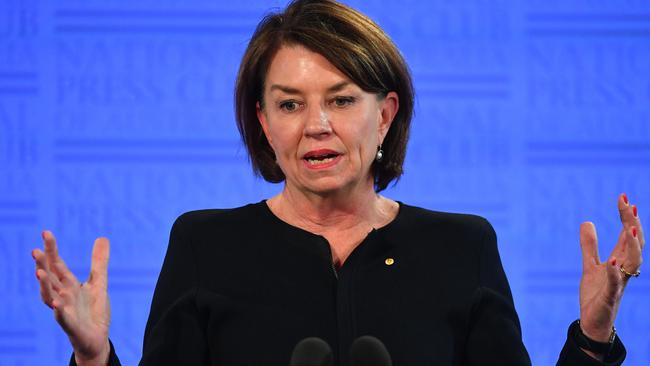Ignore bitcoin at your peril, naysayers warned
IMF chief Christine Lagarde’s qualified endorsement of bitcoin should put sceptics of digital currencies on notice.

It’s taken all of three weeks for bitcoin to erase the losses it suffered when JPMorgan chief executive Jamie Dimon dismissed the digital currency as a fraud, likening the current investor hysteria to the “tulip mania” that swept through Holland in the 17th century.
Dimon’s bruised ego might not recover so easily, particularly with International Monetary Fund chief executive Christine Lagarde’s qualified endorsement of bitcoin.
Lagarde told a Bank of England conference in London last Friday that virtual currencies might just give existing currencies and monetary policy a “run for their money”.
The IMF chief’s view is that, for now, bitcoin and its kind pose little or no challenge to the current order of fiat currencies and central banks, because they’re too volatile, too risky and the underlying technology of blockchain is not yet scalable. Some cryptocurrencies have also been hacked.
The problem for Dimon and his adherents is that Lagarde’s emphasis is very much on the words “for now”.
One day, she says, it might be easier and safer to hold a digital currency than to obtain paper bills, especially in remote regions.
Virtual currencies could also become more stable. For example, they could be issued one-for-one for dollars, or a stable basket of currencies.
The dark art of bitcoin issuance could be made transparent, governed by a credible, defined rule and an algorithm that can be monitored.
“So in many ways, virtual currencies might just give existing currencies and monetary policy a run for their money,” Lagarde said. “The best response by central bankers is to continue running effective monetary policy, while being open to fresh ideas and new demands as economies evolve.”
Lagarde went further, urging delegates to consider the demand for new payment services in countries where the shared, decentralised service economy is taking off.
In such countries, small peer-to-peer payments, often across borders, are mushrooming. While these payments can be made with credit cards, the charges are quite high.
Virtual currencies, sometime in the future, might be preferable because they offer the same cost and convenience as cash — no settlement risk, no clearing delay and no intermediary to check accounts and identities.
“If privately issued, virtual currencies remain risky and unstable, citizens may even call on central banks to provide digital forms of legal tender,” Lagarde said.
“So, when the new service economy comes knocking on the Bank of England’s door, will you welcome it inside? Offer it tea — and financial liquidity?”
Perhaps with Dimon in mind, Lagarde warned her audience that they should keep an eye firmly on the future, because experts had once argued that personal computers would never be adopted and tablets would only be used as expensive coffee trays.
The IMF boss’s provocative view on cryptocurrencies is but the latest to emerge from the world of global finance.
Former US Federal Reserve chair Ben Bernanke is in the Dimon camp (“Bitcoin has serious problems”), as is Berkshire Hathaway legend Warren Buffett (“Bitcoin is not a currency”).
Among those on the other side of the divide are Morgan Stanley boss James Gorman (“More than just a fad”), and Fidelity CEO Abby Johnson (“I’m a believer”).
Banks’ bid to win hearts
Stung by persistent and widespread community hostility, the banking industry is considering an advertising campaign to try and present the industry in a more “personal” light.
The campaign, through the Australian Bankers’ Association, has yet to seen by the ABA board and its chairman, National Australia Bank chief executive Andrew Thorburn.
However, it’s understood that people in the industry, such as tellers, will be featured as part of efforts to personalise banks that are often portrayed as too heavily focused on investors and profits at the expense of customers.
The campaign is also the latest response to a wave of punitive regulation, exemplified in last month’s banking executive accountability regime. In a move that enraged the ABA, the banks were only allowed a week to prepare submissions on the BEAR.
Chief executive Anna Bligh said on Friday there were major flaws in the bill, particularly a lack of clarity in critical areas and contradictions with the explanatory memorandum.
It was unclear, she said, which parts of the banks — and how many of their employees — were subject to the regime.
The ABA budget spiked in the 2017 financial year, with $8.6 million spent on so-called “special projects” over an eight-month period ending last February.
The association’s six-point reform package, launched in April to address political and regulatory concerns about bank conduct and culture, absorbed $2.6m, and $3m was allocated to the “better banking” advertising campaign.
A further $2.7m was spent on the lobby group’s strategic communications adviser, Newgate.
The expenditure predated the Turnbull government’s ambush of the sector with a $6.2bn bank levy in the May budget.
The Weatherill government in South Australia followed up in June with its own levy proposal to raise $370m.
While the banks accepted the right of the commonwealth to impose a levy, they have unleashed a multimedia campaign to try to kill the South Australian tax and prevent a state-levy contagion.
According to sources, the ABA allocated $8m-$10m to the campaign, which is overwhelmingly targeted at SA.
gluyasr@theaustralian.com.au
Twitter: @Gluyasr



To join the conversation, please log in. Don't have an account? Register
Join the conversation, you are commenting as Logout